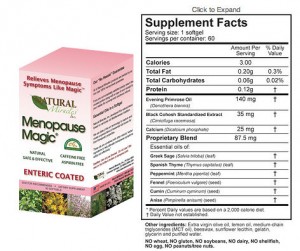Alternative medicine and the ‘pause: what your gynecologist is thinking
Women rank among the highest consumers of complementary and alternative medicine for their healthcare, and according to the National Center for Complementary and Alternative Medicine, age matters. In fact, the largest percentage of adults reporting that they use alternative medicine strategies are 50 to 59 years old, and as many as 42% discuss their use with their doctors. However, what does your gynecologist think about complementary and alternative medicine use? Is she or he supportive and what modalities tend to rank highest in terms of recommendations or endorsements? Moreover, how do gynecologists differ in their opinions?
In the U.S., most ob/gyns appear to believe that convention medicine practices for reproductive issues might benefit by the integration of complementary strategies. However, most of the positive beliefs focus on biofeedback, chiropractic, acupuncture or meditation. Conversely, the doctors report that they would not recommend dietary changes or Traditional Chinese Medicine and a majority were not strong supporters of herbal medicine. This is in direct conflict with German gynecologists. But why should we care about the Germans and what they think!!!?
To digress, I don’t know how many of you are familiar with the Commission E Monographs but, they comprise the world’s leading scientific summaries on the use of medicinal herbs in health and disease. In the late 1970s, the German Ministry of Health established Commission E, a panel of experts charged with evaluating the safety and efficacy of the herbs available in pharmacies for general use. In all, the group published 380 herbal monographs that are considered “the most accurate information available in the entire world on the safety and efficacy of herbs and phytomedicines.” Hence, the Germans definitely have a leg up when it comes to alternative medicine, at least when it comes to the use of herbal alternatives.
So, let’s take a look at a similar survey experience newly published in Complementary Therapies in Medicine, in which over 2,500 respondents indicated a familiarity with the use of alternative medicine specifically for menopausal symptoms. Almost all of the gynecologists had some experience with black cohosh, chaste tree berry and St. John’s Wort and believed them to be effective. And the modality that they felt was most effective? Lifestyle changes and alteration (think: change in dietary habits, physical activity, reduction of stress, etc). The least effective strategies, at least in the eyes of German doctors, were yoga, acupuncture and homeopathy.
The researchers point out that the viewpoint of German doctors is important because these practitioners play an important and consistent role counseling women who complain of menopausal symptoms. The same is true for their U.S. counterparts. And yet, despite the wealth of data in the Commission E monographs, many doctors still continue to question effectiveness and scientific evidence supporting the use of alternatives.
Will this make a difference with regard to the choices that women are making? Probably not, because as I’ve been writing for years, one size does not fit all, especially when it comes to weighing the benefits versus the risks of hormone replacement.
The next time you have your annual with your gynecologist, find out what she or he thinks of complementary and alternative and strategies and most of all, ask why. What she or he is thinking might not be aligned with what you find works best for you.
Read More
Wednesday Bubble: Do you believe in magic?
If you believe in magic, come along with me…
-The Lovin Spoonful, 1965.
A lot has changed since the Lovin Spoonful released their Billboard Hot 100 hit ‘Do you believe in magic.’ And a lot has not changed. Just take a look around and you may see a 20 something year old hipster walking down the street in a fur vest, handlebar ‘stache and some rockin’ bottom bells, suede fringed bag, floppy ass hat or hotter than hot pants. And there are still miracles to be found in little white pills. Although today’s ‘little helper’ comes in the form of Menopause Magic.
Indeed, this ‘one size fits all’ tablet will cure all that ails, “relieve menopause symptoms just like magic!” Manufactured by Natural Miracles, Menopause Magic contains a natural blend of oils and herbs to relieve hot flashes, night sweats, backache, joint discomfort, low libido, vaginal dryness, forgetfulness, moodiness and abnormal menstrual periods. OMG! It MUST be magic! And, they even have laboratory studies to prove effectiveness!
Mind you, each pill contains black cohosh,which may help with those flashes, depending on the dosage and manufacturing practices. However, I have not seen much information on spanish thyme, greek sage or fennel or extra-virgin olive oil and menopause (truth be told, it has me thinking about my next meal!) But I digress.
Listen up ladies: there is no magic in menopause relief. It takes research, communication with a licensed, well-versed health practitioner and trial and error. Save your hard earned dollars on something other than these particular little white pills.
Sending love. In Spoonfuls.
Read More
Just chew your [fill in the blank] away…with Zoft
[Photo does not depict actual product]
No! It really works! And it’s as easy as chewing gum.”
“What’s that,” you ask?
Now you can just chew the menopause [blues/anxiety/hot flashes, mood swings, night sweats, heart palpitations, urinary problems AND vaginal dryness] away! Wow – who knew it was so simple? In fact, Zoft ® Balance Gum (previously called Zoft Menopause Gum) will cure what ails you in just weeks if not days, with the added benefit of fighting dental decay, improving concentration AND fighting bad breath.
Zoft balance is a unique blend of Dong Quai Root, Black Cohosh Root Extract, Damiana Leaf, and Mexican Wild Yam Root, harnessing the power of indigenous knowledge to fight menopausal symptoms. Moreover, this breakthrough has been featured on ‘The View’ not once, but TWICE, which of course, provides an authoritative testimonial as to its efficacy.
Wait! There’s more….the company also offers Fulfill gum (pun intended???) to enlarge your breasts WITHOUT surgery, and Slim gum to help you get back into that size 4 pair of jeans. And just in case your partner feels left out, the company manufactures Relax gum to take that stress out of his or her life.
One-stop shopping for all that ails. Chew on that, won’t you?
Read More
Hot flashes and Japanese herbal medicine: the lowdown on TU-025
Women who choose to go the alternative route for menopausal hot flashes have few evidenced-based options. Although acupuncture and standardized black cohosh have been shown to be effective in ameliorating hot flashes, others, including red clover and even soy, have been less successful. Consequently, herbal practitioners often turn to Traditional Chinese medicine (TCM) herbal formulations or the lesser known (in the U.S.) Japanese multiherb medicinal formulations known as Kampo. Interestingly, the term Kampo refers to ‘the way of China” and the practice which is several thousand years old is based on TCM.
Kampo is prescribed by over 90% of Japanese gynecologists and is regulated by the Japanese Ministry of Health to insure manufacturing standards and product stability. One of the most popular Kampo agents for perimenopausal hot flash management is an 1,800 year old formulaton known as “keishibukuryogan” or in the US, as TU-025. Comprised of a combination of cinnamon bark, peony root, peach kernal and mountain bark, it active ingredient remains unknown. Japanese data from both the government and the manufacturer demonstrate a very low incidence of side effects and no estrogenic activity, which means that theoretically, it could be safely used by women who have had breast or gynecologic cancers. Nevertheless, its utility in American women has not been known, at least until now.
In a study published in the August issue of Menopause, 178 postmenopausal women were randomly assigned placebo, 7.5 g/daily TU-025 or 12.5 g/daily TU-025 for 12 weeks. All participants reported 28 or more hot flashes a week, had been in menopause for at least a year, had stopped using hormones for at least 8 weeks if they were already using them, smoked less than 10 cigarettes a day and most were slightly overweight or obese (based on body mass index). None were using antidepressants (which studies have shown may help alleviate hot flashes), nor did they have a history of breast or uterine cancer. While the 7.5 gram daily is the dose taken most often by Japanese women, the researchers upped the dose to 12.5 gm daily to account for a larger sized American woman.
Read MorePuffing away the years: smoking and early menopause
A few years ago, I wrote a post linking cigarette smoking to early menopause. And yet, questions remained about duration of smoking and the quantity of cigarettes in terms of their influence on timing. Hence, I thought that it might be worthwhile to take a closer look at the issue and see if there was more information.
A few facts:
It’s estimated that by the year 2030, there will be over 1 billion menopausal women in the world, with roughly 47 million women entering menopause annually. Yikes! That’s a whole lotta hot flashes, night sweats, mood swings and the like. And, what this means is that information is power (and empowering). Importantly, research has also shown that early menopause is associated with greater mortality, heart disease cases and osteoporosis. In fact, for every year that menopause is postponed, there is a 2% reduced chance of death due to heart disease. On the other end of the spectrum is late menopause, which is also associated with health issues, including an increased risk for breast, ovarian and uterine cancer.
So, what are the factors that appear to determine the timing of menopause? Well, things like obesity, alcohol consumption, mother’s age, social class, long menstrual cycles, multiple childbirths, oral contraceptive use and even exposure to pesticides have been linked to later menopause, while smoking has been shown in multiple studies to increase the likelihood for early menopause. This issue may be even more relevant for the late Boomer generation who came to age in the 70s, a time when cigarette and marijuana smoking were the norm and not the exception. That generation, by the way, is my generation.
Here’s what we know:
In a thorough review of 109 published studies, researchers have found the following:
- Current smokers appear to enter menopause anywhere from 2.5 months to 2.5 years earlier than non-smokers and have 1.3 to 1.7 times greater odds for early menopause
- Former smokers appear to start menopause as much as 2 years earlier than non-smokers, with the risk ranging from 30% to as high as 80%
- Although there is not a lot of information on the severity of smoking habit and menopause (i.e. number of cigarettes smoked daily), there is some indication that women who smoked more than 20 cigarettes daily were likely to start menopause as much as 2 years earlier than women who smoked 11 to 20 cigarettes daily
- The relationship between number of years having smoked and early menopause is unclear
There are numerous reasons why smoking may lead to earlier menopause, including interference with estradiol levels, an increased loss of eggs and an increase in the levels of androgen hormones, which counteract activity of estrogen in the body. And, despite the differences between the studies that the researchers examined, they say that a clear link was demonstrated between smoking and starting menopause at an earlier age. The impact of quantity and time (or years) smoking is less consistent and still not completely clear.
The overriding message is that if, like me, you are a former smoker, you might find yourself in a position of starting menopause a wee bit earlier than expected. Consequently, there’s no time like the present to start taking preventive measures, like increasing calcium intake, changing your dietary habits or improving your exercise regimen. Mind-body exercises like meditation or yoga can ameliorate stress and improve overall wellbeing. And black cohosh? Personally, I swear by it. In concert, these steps might shut down or at least keep the magic menopause dragon at bay.
Read More










